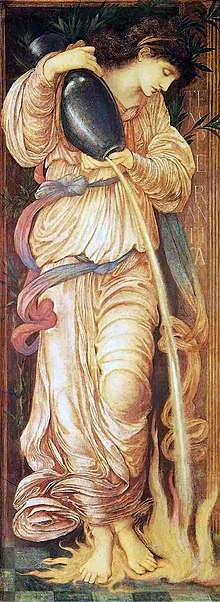Sophrosyne
Sophrosyne (Greek: σωφροσύνη) is an ancient Greek concept of an ideal of excellence of character and soundness of mind, which when combined in one well-balanced individual leads to other qualities, such as temperance, moderation, prudence, purity, decorum, and self-control. An adjectival form is "sophron."[1]

It is similar to the concepts of zhōngyōng (中庸) of Chinese Confucianism[2] and sattva (सत्त्व) of Indian thought.[3][4]:1
Ancient Greek literature
In Greek literature sophrosyne is considered an important quality, and is sometimes expressed in opposition to the concept of hubris. A noted example of this occurs in Homer's The Iliad. When Agamemnon decides to take the queen, Briseis, away from Achilles, it is seen as Agamemnon behaving with hubris and lacking sophrosyne.[5] In Homer's Odyssey, Odysseus avoids being turned by Circe the enchantress into an animal by means of a magical herb, moly (symbolizing, by some accounts, sophrosyne), given to him by Athena (Wisdom) and Hermes (Reason).[6]
Heraclitus's fragment 112 states:[7]
σωφρονεῖν ἀρετὴ μεγίστη, καὶ σοφίη ἀληθέα λέγειν καὶ ποιεῖν κατὰ φύσιν ἐπαίοντας |
Sophrosyne is the greatest virtue, and wisdom is speaking and acting the truth, paying heed to the nature of things |
Themes connected with sophrosyne and hubris figure prominently in plays of Aeschylus, Sophocles and Euripides; sophrosyne is recognized as a virtue, although debased forms like prudery are criticized.[8] Sophrosyne is a theme in the play Hippolytus by Euripides, where sophrosyne is represented by the goddess Artemis and is personified by the character Hippolytus.[9][10]:71–123
Goddess
The 6th-century BCE poet Theognis of Megara mentions Sophrosyne as among the daimona that were released from Pandora's box.[11]
The De Astronomica lists Continentia among the daughters of Erebus and Nyx, who is thought to be the Roman equivalent of Sophrosyne.[12]
Plato
Sophrosyne is an important topic for Plato. It is the main subject of the dialogue Charmides, wherein several definitions are proposed but no conclusion reached; however the dramatic context connotes moral purity and innocence. An etymological meaning of sophrosyne as "moral sanity" is proposed in Cratylus 411e. Plato's view of sophrosyne is related to Pythagorean harmonia (Republic 430e−432a, 442c) and closely linked with Plato’s tripartite division of the soul: sophrosyne is the harmonious moderation of the appetitive and spirited parts of the soul by the rational part (e.g., Phaedrus 237c−238e).[13]
After Plato
For the Stoic, Zeno of Citium, sophrosyne is one of the four chief virtues.[14] Later Stoics like Musonius Rufus, Seneca, Epictetus, and Marcus Aurelius took a practical view of sophrosyne and share a definition of it as the restraint of the appetites.[5]:228–9
Demophilus, a Pythagorean philosopher of uncertain date, wrote:[15]
Ρώμη ψυχής σωφροσύνη αύτη γαρ ψυχής απαθούς φώς εστιν |
The vigor of the soul is sophrosyne, the light of a soul free of disturbing passions. |
Cicero considered four Latin terms to translate sophrosyne: temperantia (temperance), moderatio (moderateness), modestia (modesty) and frugalitas (frugality).[16] Through the writings of Lactantius, St. Ambrose and St. Augustine, the virtue's meaning as temperance or "proper mixture" became the dominant view in subsequent Western European thought.[17]
Sophrosyne, according to St. Thomas Aquinas, is the fourth and final cardinal virtue.[18]:125–126
See also
| Look up sophrosyne in Wiktionary, the free dictionary. |
References
- Euripides. Hippolytos. Oxford: Oxford University Press. 1973. ISBN 978-0-19-507290-7. p. 6.
- 林之满 萧枫, ed. 2014. 流光溢彩的世界古典史. Changsha: Green Apple Data Center. p. 237.
- Curzer, H. J. 2012. Aristotle and the Virtues. Oxford: Oxford University Press. p. 77.
- Schadé, J. P., & Wiener, N., Progress in Biocybernetics (Amsterdam: Elsevier, 1966), p. 1.
- North, Helen. 1966. Sophrosyne: Self-Knowledge and Self-Restraint in Greek Literature. (Cornell Studies in Classical Philology 35). Ithaca: Cornell University Press. ISBN 9780801403187. JSTOR 10.7591/j.cttq4533.
- Clarke, Bruce (1995). Allegories of Writing: The Subject of Metamorphosis. Albany: SUNY Press. ISBN 9780791426234. p. 127.
- Hyland, D. A. 2008. Plato and the Question of Beauty. Bloomington: Indiana University Press. p. 105.
- North, Helen F. 1947. "A Period of Opposition to Sôphrosynê in Greek Thought." Transactions and Proceedings of the American Philological Association 78:1–17.
- Euripides. Hippolytus. Bagg, Robert. Introduction. Oxford University Press. 1973 ISBN 978-0-19-507290-7.
- Barnes, H. E., "The Hippolytus of Drama and Myth", in D. Sutherland & H. E. Barnes, eds., Hippolytus in Drama and Myth 75, Nr. 2, Lincoln NE, 1960, pp. 71–123.
- Rademaker, A. 2005. Sophrosyne and the Rhetoric of Self-Restraint: Polysemy & Persuasive Use of an Ancient Greek Value Term. Leiden & Boston: Brill. pp. 76–78.
- Atsma, Aaron J. "Sophrosyne". Theoi Project. Retrieved 2019-05-28.
- Peters, Francis E. (1967). Greek Philosophical Terms: A Historical Lexicon. New York: NYU Press. p. 179. ISBN 9780814765524.
- Peters, Greek Philosophical Terms, p. 180.
- Sentences of Demophilus 39 = Stobaeus, Florilegium, vol. 1. Leipzig: Teubner, 1855, p. 117 (Peri Sophrosyne 42).
- Cicero, Tusculan Disputations 3.8.16.
- Carr, M. F. (2012). Passionate Deliberation: Emotion, Temperance, and the Care Ethic in Clinical Moral Deliberation. Berlin: Springer Science & Business Media. p. 29. ISBN 9789401005913.
- Harrington, Daniel; Keenan, James (2010). Paul and Virtue Ethics. Lanham, MD: Rowman and Littlefield Publishers. pp. 125–126.
Further reading
- North, Helen F. 1947. "A period of opposition to sôphrosynê in Greek thought." Transactions and Proceedings of the American Philological Association 78:1–17.
- — 1966. Sophrosyne: Self-knowledge and self-restraint in Greek literature 35. Ithaca, NY: Cornell University Press.
- Rademaker, Adriaan. 2004. Sophrosyne and the rhetoric of self-restraint: polysemy & persuasive use of an ancient Greek value term. Brill.
- Van Tongeren, Paul. 2001. "Nietzsche's revaluation of the cardinal virtues: The case of Sophrosyne." Phronimon: Journal of the South African Society for Greek Philosophy and the Humanities 3:128–49.
